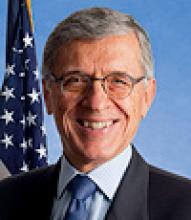
Fast, affordable Internet access for all.

FCC Chairman Tom Wheeler released a statement yesterday supporting the concept of local authority for community broadband infrastructure. Chattanooga and Wilson filed petitions to scale back state restrictions last summer. In his statement, Wheeler officially recommended the Commission approve the petitions. If approved, the petitions have the potential to liberate local communities from state restrictions.
Along with a number of other organizations that advocate local authority, the Institute for Local Self-Reliance supports Chairman Wheeler who said:
Communities across the nation know that access to robust broadband is key to their economic future – and the future of their citizens. Many communities have found that existing private-sector broadband deployment or investment fails to meet their needs. They should be able to make their own decisions about building the networks they need to thrive. After looking carefully at petitions by two community broadband providers asking the FCC to pre-empt provisions of state laws preventing expansion of their very successful networks, I recommend approval by the Commission so that these two forward-thinking cities can serve the many citizens clamoring for a better broadband future.
Chris Mitchell, Director of the Community Broadband Networks Initiative at ILSR.org and the editor of MuniNetworks.org said:
The Chairman's statement is a breath of fresh air. This approach will allow communities with little or no choice in providers to take control of their own connectivity. When local communities have the authority to invest in publicly owned infrastrucuture without state barriers, more businesses and residents have fast, affordable, reliable Internet access. Even just the possibility of a community network can incent large scale providers to improve their services. We are pleased to see Chairman Wheeler both talk the talk and walk the walk of restoring local decision-making authority.
A statement of support quickly followed from the Georgia Municipal Association:
Prohibiting government from providing this economic development infrastructure, or limiting its ability to do so, is counter to the wishes of the community and to the best interest of cities, states and our nation.
Next Century Cities, the coalition of over 50 communities working to restore local Internet choice, recently delivered a letter [PDF] from 38 member cities to the FCC, urging the Commission to consider local autonomy. Deb Socia, the Executive Director, applauded the statement:
If we want truly next-generation broadband, then cities across the country need to be in the driver’s seat. That’s why they are looking to the FCC to uphold their ability to make the best choices for their communities and residents.
Every community should have the right to determine its broadband needs and the path of its digital future, including the ability to pick competition over monopoly for broadband services. Chairman Wheeler has taken an important first step by advancing these two petitions forward.
The Media Mobilizing Project, involved in efforts to improve connectivity in Philadelphia, stated that it strongly supports Chairman Wheeler's plan to restore local authority:
Philly, every city in PA, and every community nationwide deserves the right to explore high quality competition to our communications monopolies - to drive prices down, quality up, and access to everyone, poor and working people and beyond. We look forward to Chairman Wheeler's continued leadership on this issue, and expanding options for our communities - who strongly believe that access to high quality communications is a human right.
"What a great step approval would be toward bringing broadband to every American,” agreed former FCC Commissioner Michael Copps, now serving as special adviser to Common Cause’s Media and Democracy Reform Initiative. “We built this country with federal and community partnerships for vital infrastructure, and what's more vital than broadband for the 21st century? A big high-five to Chairman Tom Wheeler and the colleagues who have joined him to push this move.”
The Coalition for Local Internet Choice (CLIC) also passed a "big high-five" to the Chairman:
CLIC applauds Chairman Wheeler for his leadership and recognition that local communities play an integral role in ensuring broadband competition for their residents. This is a big step forward and just the beginning — we look forward to working with the Chairman, the rest of the Commission and other stakeholders to remove barriers to better broadband around the country.
For more on the Chattanooga and Wilson petitions, we encourage you to listen to episode #120 of the Community Broadband Bits podcast, in which we debunk a series of arguments against restoring local authority.
Chris also had an informative interview with Harold Feld on section 706 in episode #84. In that interview, published well before the Chattanooga and Wilson petitions were filed, the Senior Vice President of Public Knowledge dissected how the DC Circuit Court came to the conclusion that paved the way for the petitions.
Good stuff!
